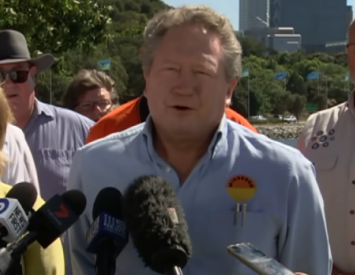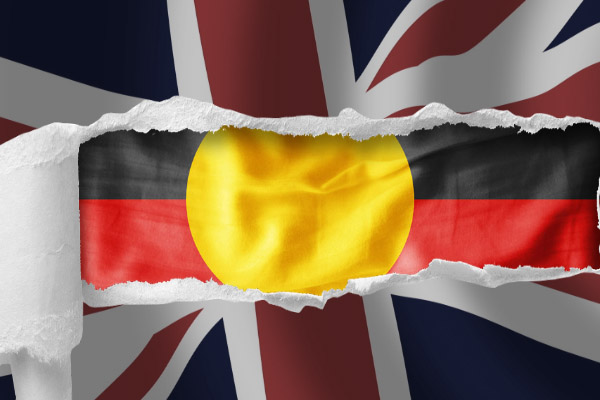A proposed accord between the Yindjibarndi people and the mining industry could prove beneficial, writes Dr Robert Wood.
LAST MONTH, Andrew “Twiggy” Forrest lost his High Court appeal to a Federal Court ruling in October 2019 that acknowledged the exclusive ownership of Yindjibarndi people of their country. This is where Forrest’s company, Fortescue Metals Group (FMG), has its Solomon iron ore mine, which has extracted billions of dollars of profit from the ground itself.
The ruling represented the end of a 17-year struggle led by traditional owner Michael Woodley. It also represents an important milestone in the ongoing history of the Pilbara and has far-reaching consequences for Native Title, sovereignty, and Yindjibarndi political power. It also positions Woodley as a nationally significant figure in First Nations conversations who is recognised for his leadership role.
This story also fits in with the ongoing desecration of sacred sites, including the Rio Tinto blasting that happened in the same week, the role of protest in the Pilbara and how that matters for the return of country and the legacy of the Forrest family in Western Australia.
The Forrest family has a long and storied role in Western Australia, and FMG CEO Andrew Forrest is simply the current face of this. As an industry leader, he has an outsized role in the state itself. If there is a pie going around, Forrest has his finger in it — new accommodation at the University of Western Australia, charitable and cultural influence with Minderoo, sport sponsorship with the Western Force and, of course, the sourcing and selling for profit of personal protective equipment during the height of the first wave of COVID-19.
Yet, perhaps more prominent in the historical ledger of the Forrest family was his ancestor, John Forrest. John was the first premier of Western Australia who went on to have a career in national politics during the Federation. What interests me here is John Forrest’s opposition to a specific clause in the law, namely Section 70 of the Constitution regarding self-government in the state.
That clause sought to guarantee, upon the British Crown’s request, whatever was greater between 5,000 pounds or one per cent of gross revenue to be used towards Aboriginal welfare. Forrest opposed this until it was repealed in 1905, including public opposition to any state support for First Nations people. It seems the colonial impulse to divide and conquer runs deep, which is what Andrew tried to do by sowing seeds of discontent among Yindjibarndi people as well. This is a family trait, it seems.
Of course, it must be remembered that First Nations people were forced to work for rations having been dispossessed of their country during the colonial period. This was the case in the Pilbara until the 1946 strike, which is an important touchstone for events last month. On 1 May of that year, 800 Aboriginal pastoral workers walked away from station owners who were exploiting them without pay.
Led by traditional owners Dooley Bin Bin and Clancy McKenna and with help from white activist Don McLeod, the strike went on for a number of years and was broadly successful. It was written about by white authors like Dorothy Hewett and Donald Stuart and had its own song poets such as Donald Norman.
The strike represents an important moment when First Nations politics became legible to white authority. Firmly gone were the days of massacres, but exploitation was still happening in industrial relations. The strike changed that even as there is an ongoing struggle when it comes to wages, profit and rights, let alone incarceration.
This is where the High Court decision in favour of the Yindjibarndi people is historically significant. It is the continuation of a struggle that has the weight of morality and traditional law behind it. To be clear, Yindjibarndi and FMG still must negotiate compensation, and FMG should still offer a meaningful apology for their treatment of the community.
But the High Court decision is the result of the desire to get country back. This now might include a billion-dollar payout, a say in future operations and the right to pursue Native Title in a way that respects the say of traditional owners in everyday life.
It may also pave the way for a Pilbara Accord.
The Pilbara Accord could be considered a political enterprise led by traditional owners to renegotiate the terms of commerce in their country, especially when it comes to mining.
There are several minor and a few major ways this matters, including:
- the ability to be paid compensation for desecration rather than giving it to the State Government (as is the current case);
- the guaranteed employment of locals in industry on a pathway out of poverty;
- the payment of dividends from companies already operating there;
- the power of veto later on; and
- the ability to map out a meaningful future when it comes to the future of the Pilbara.
For example, if royalties are to be paid at the moment, there is no fair level at which this is set, precisely because mining companies and the State Government are able to flex their power when necessary. The Pilbara Accord between different groups of traditional owners might raise it by one per cent every time a new agreement is made until full sovereignty is reached. It is possibilities like this that are opened up by the Yindjibarndi determination.
Yindjibarndi people are to be recognised for their victory, for it signals a new set of possibilities that are part of a bright future in the Pilbara. This matters to other regions in Australia when it comes to issues of commerce and profit, sovereignty and land use and what happens through collective action and charismatic leadership. From the outside, this is a historic moment that speaks to the good of citizens when the law performs its role in administering justice for all.
Dr Robert Wood is Chair of PEN Perth. A Malayali with East Indian Ocean connections, he lives on Noongar Country in Western Australia. The author of four books, Robert has held fellowships at the University of Pennsylvania and Columbia University.
 This work is licensed under a Creative Commons Attribution-NonCommercial-NoDerivs 3.0 Australia License
This work is licensed under a Creative Commons Attribution-NonCommercial-NoDerivs 3.0 Australia License
Support independent journalism Subscribe to IA.












